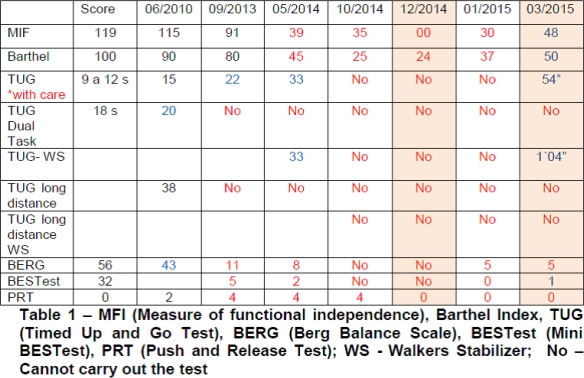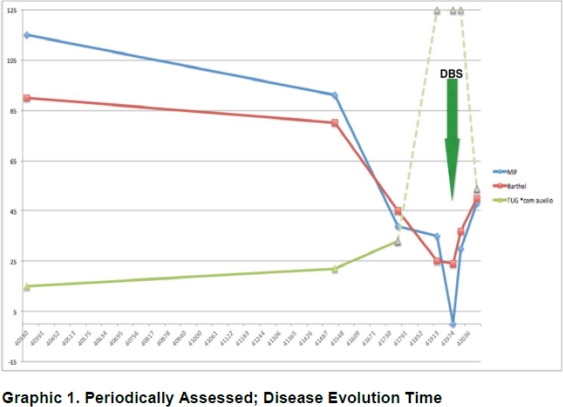Session Information
Date: Monday, June 20, 2016
Session Title: Surgical therapy: Other movement disorders
Session Time: 12:30pm-2:00pm
Location: Exhibit Hall located in Hall B, Level 2
Objective: The aim of this study was to analyse the motor outcome before and after 6 month follow-up in a HD patient treated by GPi-DBS.
Background: The lack of efficacy of Huntington’s Disease (HD) symptomatic medications and the adverse effects of current medications have led to an interest in determining the efficacy of deep brain stimulation (DBS) in the treatment of HD, reflecting the pathophysiology of HD as a circuit disorder. Studies suggest that globus pallidus internus (GPi) DBS can be a potential therapeutic option in patients with refractory chorea, but few cases have been reported in the literature.
Methods: We report a case of a 54-year-old woman with HD treated for 13 years pharmacologically and physicaltherapy. The chorea progressively become refractory to medical treatment, despite very high doses of dopamine antagonists, resulting in functional impairment and incapacity on daily life activities. As cognitively the patient remained stable, bilateral deep brain stimulation of the GPI was performed. The motor status was assessed before and after the surgery by the UDHRS, MFI (Measure of functional independence), Barthel Index, TUG, BBS, Mini BESTest, PRT (Push and Release Test) .
Results: There was a significantly improvement in chorea after the DBS. There was a significant decrease in anti-choreatic drugs dosage after DBS. Besides the great decrease of chorea, the functional motor signs as gait and balance and daily activities also improved. In Rehabilitation program continuum to improve the physical motor aspects. The motor and physiotherapy aspects before and after surgery are shown on Table 1  and Graphic 1
and Graphic 1  . These parameters that were assessed before and after DBS were important to show follow up and were the secondary outcomes compared with pre and post-operative baseline like balance and gait. We could see clearly the Disease evolution Time, the motor impairments before DBS and improvement in post-operative period. The significant suppression of chorea was observed after 6 month of DBS, with sustained therapeutic effect; there were significant reduced drugs after DBS.
. These parameters that were assessed before and after DBS were important to show follow up and were the secondary outcomes compared with pre and post-operative baseline like balance and gait. We could see clearly the Disease evolution Time, the motor impairments before DBS and improvement in post-operative period. The significant suppression of chorea was observed after 6 month of DBS, with sustained therapeutic effect; there were significant reduced drugs after DBS.
Conclusions: GPi DBS may provide sustained chorea improvement in selected HD patients with pharmacologically resistant chorea, with benefit in physical motor aspects and in daily life activities. Further studies measures are needed to evaluate the impact of DBS in the long-term outcome of HD.
To cite this abstract in AMA style:
T.T.C. Capato, R.G. Cury, R. Gimaães, E.T. Fonoff, M.S. Haddad. Functional motor outcomes after globus pallidus internus deep brain stimulation in Huntington´s disease – A case report [abstract]. Mov Disord. 2016; 31 (suppl 2). https://www.mdsabstracts.org/abstract/functional-motor-outcomes-after-globus-pallidus-internus-deep-brain-stimulation-in-huntingtons-disease-a-case-report/. Accessed December 22, 2025.« Back to 2016 International Congress
MDS Abstracts - https://www.mdsabstracts.org/abstract/functional-motor-outcomes-after-globus-pallidus-internus-deep-brain-stimulation-in-huntingtons-disease-a-case-report/
